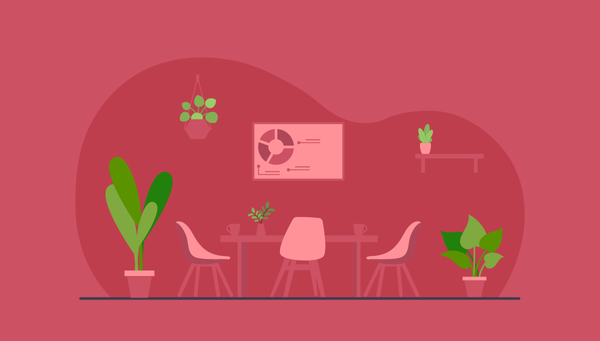Foggy Focus? 5 Ways to Deal with Brain Fog at Work
Have you ever found yourself staring at your computer screen, unable to focus, with a sense of mental fogginess? Or have you ever found yourself walking into a room thinking, “What did I come here for again ?”
If so, you're not alone. Many professionals experience what's commonly known as "brain fog" at work. This cognitive cloud can shadow productivity, hinder decision-making, and impact overall job satisfaction.
In this blog post, we'll explore brain fog, its impact on work performance, its causes, and most importantly, how to deal effectively.
What Is Brain Fog?

“Brain fog is the inability to think clearly,” Juli Fraga, Psy.D
Brain fog is a common phenomenon characterized by a hazy or unclear mental state. It can manifest as forgetfulness, lack of focus, and mental fatigue. Imagine trying to concentrate on an important task, but your thoughts seem scattered, making it challenging to accomplish anything precisely.
Brain fog is often described as the inability or difficulty to form new thoughts or express your thoughts or feelings.
According to Dr Green, you can experience brain fog even if you don't meet the full criteria for any mental health issues. You can experience it as a result of many circumstances.
Symptoms Of Brain Fog

Here are some of the common symptoms of brain fog -
-
Trouble sleeping or insomnia
-
Frequent mood swings
-
Trouble concentrating
-
Increased irritability
-
Forgetfulness
-
Lack of motivation
-
Depressive thoughts
-
Lack of mental clarity
Impact Of Brain Fog on Work Performance
Have you ever wondered what is the reason behind your not being able to think clearly? Or why are you lagging at work? Brain fog may be happening to you without your knowledge.
You become slower and less efficient when you suffer from brain fog. It can often lead to you dropping balls and burning bridges without intending to. As a result, you won't be able to make any decisions at work with precise attention to them, resulting in negative and poor performance.
Here are some examples of how brain fog can impact your work performance -
1. Decreased Productivity

The haziness that comes with brain fog often leads to decreased productivity. Simple tasks may take longer than usual, impacting overall output.
2. Errors and Mistakes
In a foggy mental state, errors and mistakes become more likely. Whether it's a typo in an email or a miscalculation in a report, brain fog can compromise the quality of work.
3. Difficulty in Decision-Making

Critical decision-making processes are hindered when brain fog sets in. Choosing the best course of action becomes a daunting task.
4. Interpersonal Challenges
Effective communication may suffer, leading to misunderstandings and potential conflicts with colleagues.
5. Impact on Mood

Brain fog can contribute to mood swings, creating a less-than-ideal work environment for both the individual and their colleagues.
Volunteering or solving brain puzzles like sudoku or crosswords can strengthen your thinking ability.
Why Might Brain Fog Be Happening To You? 4 Causes of Brain Fog At Work
Before you jump into the solutions for managing the symptoms of brain fog, first, you need to understand why or what may be causing yours. There is no precise reason you might be experiencing brain fog, but one thing is clear: the first and most important step is to take a deeper look into your lifestyle.
Although there are several explanations for why you might be experiencing brain fog, here are some of the common possible reasons behind it -
1. Stress

Typically, brain fog is considered as the coping mechanism of stress; it is the result of overwork or too much stress. And when your body can't take more of it, your brain naturally goes into pause mode.
Excessive stress reduces the blood flow to your brain, leading to mental fatigue and fragmented concentration. Exhausting your brain makes it harder to think, reason, and focus.
2. Lack of Proper Sleep
Another cause of brain fog could be the lack of sleep hygiene or sleep deprivation. Poor sleep quality and overwork can interfere with how well your brain functions. It can wear out your physical and mental health, making you tired and forgetful.
According to the 2021 research, you should aim for at least 9 to 9 hours of sleep daily.
3. Hormonal Imbalance
Brain fog can also be triggered by hormonal imbalance, according to 2018 research. You may experience short-term cognitive impairment if there is an increase or decrease in progesterone and estrogen hormones.
According to a 2019 study, a drop in estrogen during menopause or any other medical condition can cause forgetfulness, poor concentration, and cloudy thinking.
4. Food Habits And Diet

Diet and food habits play an important role in brain fog. Lack of nutrition and vitamins can affect your ability to focus and think, making you lazier. According to a 2012 study, a deficiency of B12 can cause brain fog, as it supports a healthy brain.
Consuming peanuts, dairy, or aspartame can cause brain fog if you have certain food allergies.
Suggested Read: 8 Nutritional Supplements That Everyone Should Know About
5. A History of Medical Conditions
You can develop brain fog if you have a certain history of medical conditions. Medical conditions associated with inflammation, fatigue, or changes in blood level or glucose can cause mental fatigue. Also, brain fog is one of the symptoms of chronic fatigue syndrome.
Other medical conditions that can cause brain fog include:
-
Anemia
-
Depression
-
Diabetes
-
Migraine
-
Alzheimer’s disease
-
Hypothyroidism
-
Dehydration
-
Viral infections like COVID-19
You can keep track of your daily food intake by keeping a journal or using a wellness app to log your meals. It will help you determine if your diet contributes to brain fog.
Can Brain Fog Be Managed? 5 Tips to Deal with Brain Fog at Work
The answer is yes if you are worried about brain fog or wonder if it can be managed. People experience brain fog for various reasons, and the treatments also vary. Regardless of what's causing you to feel foggy at work, you can follow a few steps to return to feeling focused, sharp, and productive.
Remember, modifying your lifestyle choices and correcting your habits can greatly assist you in managing your brain fog. Here are 5 tips for dealing with brain fog at work -
1. Get Adequate Rest And Sleep.

One of the best and most effective ways to fight against brain fog is to get enough sleep. Even if you have a looming deadline, try to take a break without guilt and get sleep. Establishing a consistent sleep routine is crucial for cognitive function.
Try to aim for 7-9 hours of quality sleep each night. And remember to go to bed at 10 pm or no later than midnight as it disrupts your natural circadian rhythm.
Suggested Read: Try the Sleep Challenge and Feel More Productive at Work
2. Prioritize and Break Down Tasks.
Being overworked leads to stress, one of the key causes of brain fog. So, to manage it, you must first declutter your calendar and take a break to prioritize the task.
Tackle one task at a time and break larger projects into smaller, more manageable parts.
Suggested Read: 47 Unique Stress Management Activities for Employees
3. Incorporate Mindfulness Into Your Lifestyle.

While work can be stressful and overwhelming occasionally, you can always hit the pause button and take some time off the screen.
Dealing with work can become difficult when you are already dealing with fatigue and other mental health conditions; taking time to practice mindfulness techniques can help you a lot.
Simple mindfulness practices like taking a 10-minute break from the screen and meditating or practicing deep breathing can help you focus your awareness in the present moment and train your mind to be clearer. It will help to alleviate brain fog and promote mental clarity.
Remember, brain fog is the opposite of mindfulness. Stepping away from work for a few minutes can help you clear your mind and refocus.
4. Get More Physically Active.

Another great way to reduce mental fog is by practicing physical activity. It can be exercise, workout, cycling, or even yoga . When you are physically active, your body releases endorphins, which help to improve your mood.
Again, research shows that practicing exercises helps improve your thinking ability, concentration, and attention. It encourages more positive thinking and better mental clarity.
Incorporating physical activity into your lifestyle doesn't need to be a rigorous workout routine or running a marathon. It can be as simple as ditching the elevator and taking up the stairs at work instead.
Suggested Read: 42 Easy Office Exercises You Can Do At Your Desk To Stay Fit
5. Maintain a Balanced Diet.
If you're in the hustle culture of rushing to work on time and not missing anything, you might miss out on proper food. Having a quick bite or ordering food from a fast food chain might have been a guilty pleasure.
As a result of this unhealthy cycle, insufficient nutrition, vitamins, healthy fats, or even protein are unavailable to the body. Consequently, mental fatigue and fog develop.
To prevent brain fog, drink plenty of water and eat nutritious meals.
Fish oil contains long-chain omega-3 fatty acids and DHA. consumption of these can help improve brain function, motor skills, and even vision.
How to Support Employees Through the Fog?
Recognizing the signs of brain fog and implementing supportive measures can significantly improve the work experience for your employees. Here are some strategies employers or organizations can implement as a part of employee wellness programs -
1. Recognize and Normalize Brain Fog

Understanding that brain fog is a common experience can help destigmatize it in the workplace. Make sure to raise more awareness and normalize discussions around mental well-being. Train managers to recognize and support employees with brain fog.
2. Offer Flexible Work Arrangements
Flexible schedules or remote work options can provide employees with the autonomy to manage their workload during periods of brain fog.
Introduce a holistic wellness program that addresses both physical and mental well-being. Include resources for stress management and mental health support.
Suggested Read: How To Boost The Mental Health Of Remote Workers?
3. Promote Healthy Habits and Well-being

Encourage regular exercise, healthy eating, and other wellness activities that contribute to overall well-being. You can achieve the same goal by encouraging employees to use wellness apps like Vantage Fit, which offers various incentivized wellness challenges.
Begin with a Vantage Fit Demo! Schedule one now! And, Start Your Corporate Wellness Journey Today
4. Adaptively Manage Workloads And Communication.
During periods of brain fog, consider adjusting workloads or providing additional support.
You can encourage employees to communicate confidently about their needs. Remember, transparency and open communication are key.
5. Foster a Supportive Culture

Create a workplace culture where employees feel comfortable communicating their needs and seeking support when necessary. You can partner with healthcare professionals for on-site consultations or workshops.
Suggested Read: 8 Ways To Create And Nurture A Culture Of Wellness In The Workplace
Summing It Up
Brain fog is a common challenge, but with proactive strategies and a supportive workplace culture, employees and employers can navigate it successfully.
By prioritizing well-being and creating an environment that recognizes and addresses mental health, you can foster a workplace where clarity of mind and productivity thrive. Embrace these strategies, and let's clear the fog together for a more focused and fulfilling workday.



